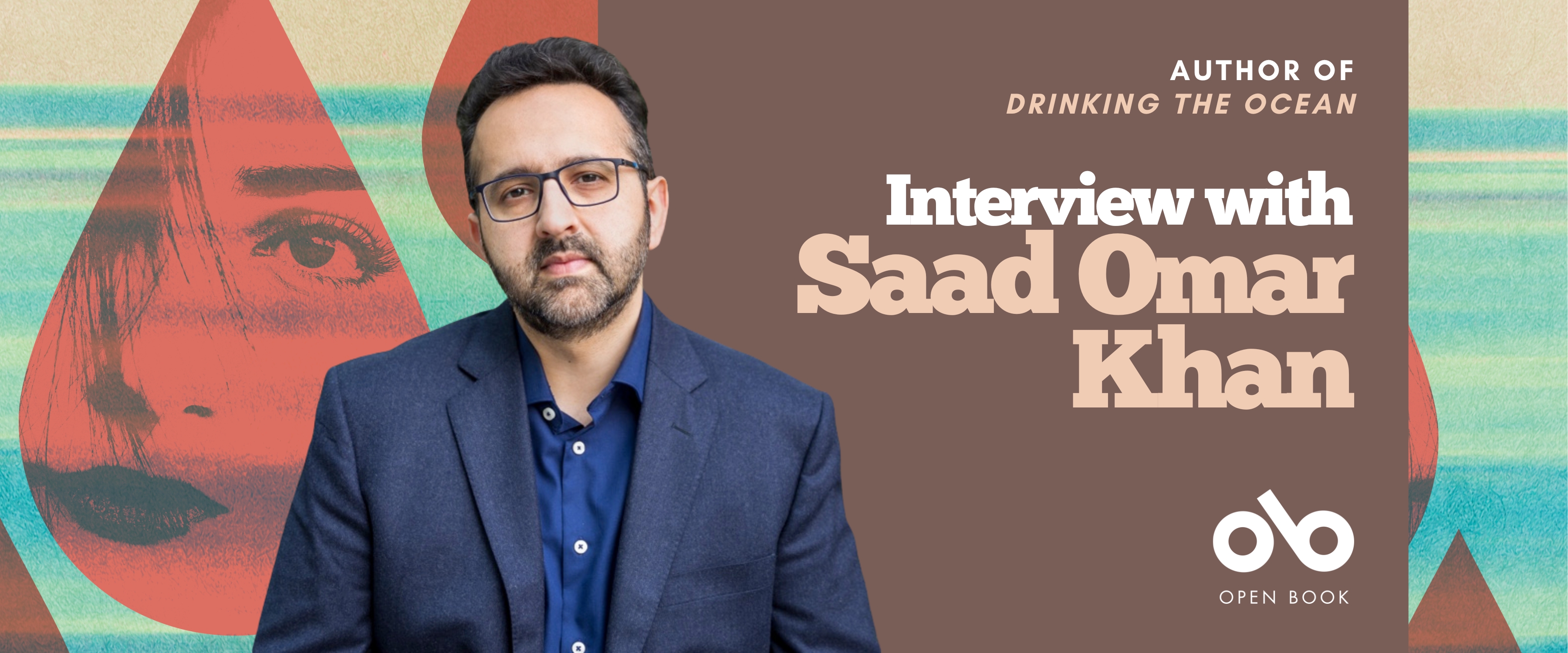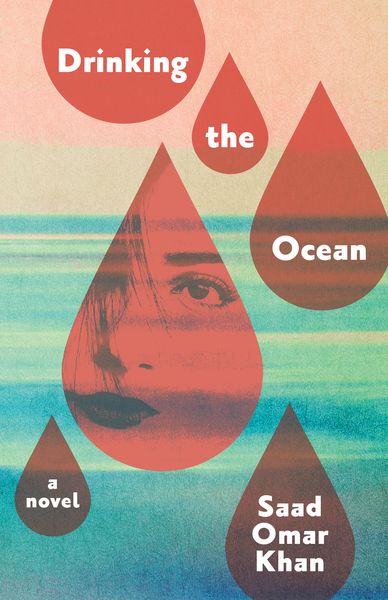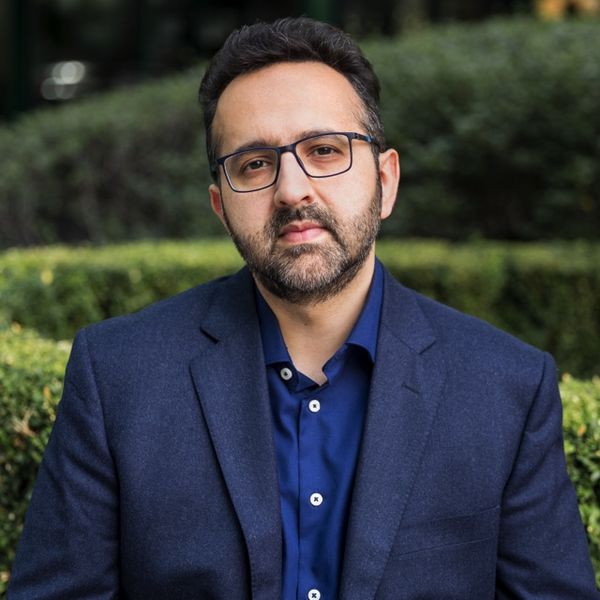Saad Omar Khan Delicately Illuminates the Arcs of Two Haunted Lives in Drinking the Ocean
Having already built a reputation for his short fiction, Saad Omar Khan is another new voice with a depth of experience and knowledge that finds its way into his storytelling. The author has now arrived with a stunning debut novel, which we're thrilled to feature today on Open Book.
Drinking the Ocean (Wolsak & Wynn) focuses on Murad, on the heels of his thirty-third birthday and going about his daily life in Toronto. Until he suddenly spies a past love at a busy intersection in downtown Toronto. The woman he once new, Sofi, is holding the hand of a small child as she walks by, and this all leaves Murad spinning as he returns home to his wife and ruminates on his his past in Lahore and London. With these two figures crossing paths again, the novel takes readers on a journey through the emotional, spiritual, and political trappings of two connected but disparate lives, driven on by fate and love.
It's fitting that we have a special Storytellers Fiction interview with the author today, so read on to learn more about this exciting new voice and debut novel!
Open Book:
Which authors have inspired you and/or influenced your work?
Saad Omar Khan:
The list of writers who have inspired me are numerous, but some that come to mind include Cormac McCarthy, Haruki Murakami, Paul Bowles, Graham Greene, Naguib Mahfouz, amongst too many others. Islamic Sufi devotional literature has been a great influence on me personally as well as artistically, something that can be seen directly in my novel Drinking the Ocean. While I don’t consider myself a poet, there are many that consistently mesmerize me no matter how often I read their work. W.H. Auden, for example, is a giant in my eyes, and there isn’t a single poem of his that doesn’t make me think he’s one of the few artists who can capture the essence of the human condition on a single page.
OB:
Do you see your writing style or philosophy reflected in a specific literary lineage, or branch of literature?
SOK:
Like many people from newcomer communities, it often seemed as I grew up that the life of an artist was not something meant for those of my background. It’s unfortunate that many Muslim and South Asian families don’t always encourage artistic pursuits, mostly out of an understandable fear of its unreliability as a vocation. This is doubly unfortunate considering the vast artistic impact Muslims have had in many artistic fields, including literature. The role of poetry in Arabic, Persian, Turkish, and Urdu-speaking cultures speaks to that legacy. There is also a legacy of artists being polymaths, with experience and expertise in a variety of fields. I think of poets like Rumi who was primarily a religious scholar, or Fariuddin Attar, who was an apothecary as well as the poet who wrote The Conference of the Birds. At the risk of sounding pretentious, I hope I can be a part of this broader lineage of writers from Muslim cultures who participate in artistic pursuits as one aspect of a holistic way of living.
OB:
Do you draw from family or community stories in your work? If so, how?
SOK:
Very much so. I’ve written pieces that have taken liberally from events witnessed or experienced by me or others in my community or family. While as a writer I reserve the right to filter these stories from my own lens, the influence of family and community plays an inevitable part in how I see the world, which in turns plays a part in what I write about. The impact of traditional “Old World” values (e.g. devotion to family, living according to religious values in a secular world) are present in my writing, with the concerns about how those values govern individual lives being important in my work. I do feel many BIPOC writers often feel a need to draw from family and community as a way of “setting the record straight” given our marginalized status in film and literature. It is through love—even a clear-eyed, unsanitized love—that we write our stories, not to portray our communities as perfect, but to ensure that by representing them in our work, they live, have value, and are remembered.
Your CanLit News
Subscribe to Open Book’s newsletter to get local book events, literary content, writing tips, and more in your inbox
OB:
What are some other forms of storytelling that inspire you, outside of traditional novel length work or short fiction?
SOK:
I’m a cinephile, so much so that at one point in time I considered being a filmmaker. Martin Scorsese is one of my favourite directors, not just because of his raw skill, but the way he’s able to represent the conflict inherent in living a sacred life in a profane world. A movie like Mean Streets (1973) can tell you as much about this fundamental tension as any work of literature. In my more ambitious moments, there are times when, as a writer, I wish I could do with Islamic spirituality what Scorsese does with his Italian-American Catholic worldview. While I can’t say it directly inspires my work, the fact that graphic novels have for years been accepted as “legitimate” forms of literature is heartening to me. A series I would recommend to anyone is The Arab of the Future by Riad Sattouf, a work that wonderfully demonstrates how graphic novels can capture sensory memories as much as Proust does.
OB:
What is the next story you’re working on, whatever form it may take?
SOK:
I’m currently working on my second novel. Tentatively titled The Spectacle, it’s the story of a jihadist insurgency in a fictional country, taken from the point of view of two brothers on opposite ideological ends of the conflict. My intention for this novel, thus far, is to examine how weak societies fracture, and how mass violence can inevitably result from ideological polarization. Apart from that, I will be publishing a short story in Augur Magazine titled “Of Blood and Pomegranates” this fall. It’s a work of speculative fiction that examines several themes, including forced migration, neo-colonial exploitation, and tribal warfare.
____________________________________
Saad Omar Khan was born in the United Arab Emirates to Pakistani parents and lived in the Philippines, Hong Kong and South Korea before immigrating to Canada. He is a graduate of the University of Toronto and the London School of Economics and has completed a certificate in Creative Writing from the School of Continuing Studies (University of Toronto) where he was a finalist for the Random House Creative Writing Award (2010 and 2011) and for the Marina Nemat Award (2012). In 2019, he was longlisted for the Guernica Prize for Literary Fiction. His short fiction has appeared in Best Canadian Stories 2025 and other publications.






